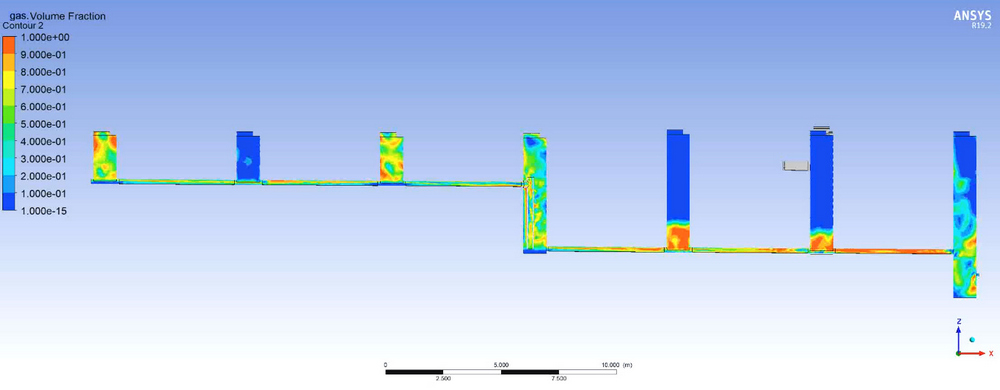09.03.2021
The problem of uncontrolled emissions of sewer gases in urban areas requires an urgent solution. Residents often complain of unpleasant odours, and cases of poisoning among the staff of sewer networks have become more frequent. At the same time, the regulatory documentation does not offer any methods to estimate the gaseous medium flow in sewage systems and predict probable leak points under various modes of network operation. Svyatoslav Fedorov, Associate Professor of the SPbGASU Department of Water Use and Ecology, PhD in Technical Sciences, is conducting research that will allow to predict areas of increased gas emissions and their impact on the urban environment.
– Eploring the process of air and gas flow in sewerage systems is of great practical importance, since it aims at improving the urban environment and ensuring environmental safety. My scientific advisor and co-author is Viktor Vasiliev, DSc, visiting professor of the Department of Water Use and Ecology. This year, we applied for a patent for the invention of a structure that regulates the flow regime in the sewer network sections.
The structure regulates the pressure of the gas and air medium and the filling of the collector in sections of the siphon-type network. This technology allows to increase the speed of wastewater flow, wash the pipeline and remove sediment accumulated in the tray, and also provides an organized removal of contaminated air.
– Please tell us more about your research.
– I have scientific articles on this topic that are co-authored with my friend and colleague Yury Stolbikhin, Deputy Dean for Academic Affairs, Associate Professor of the Department of Water Use and Ecology, PhD. My other co-author is Anna Telyatnikova, a postgraduate student of our Department. Since 2017, we have been monitoring the concentration of sewer gases in the city’s existing sewage networks. For this purpose, portable self-recording gas analysers were installed in inspection chambers, located in wastewater collection systems for network maintenance.
In addition, to study the patterns of gas spreading, we applied modelling of structures and network sections using the ANSYS CFX software. Monitoring of the sewer networks made it possible to determine dependencies reflecting the emission of hydrogen sulphide, methane and ammonia, as well as to assess the changes in pressure and temperature of the gas-air medium.
The modelling results demonstrated patterns of evolved gases distribution and zones of their accumulation in the space of wastewater collection facilities. On the basis of the studies performed, we have assessed the influence of various structures (inspection chambers, drop manholes, pressure damping chambers, etc.) on the intensity of gas evolution and the air and gas flow.
– How much attention is paid to environmental issues at the Department of Water Use and Ecology?
– We have always focused a lot on environmental issues. The Department has accumulated significant scientific experience, which allows us to take part in solving a wide range of practical problems. Studying the processes occurring in the systems of sewer networks has become a separate field of research. It is headed by a member of the Dissertation Council, Doctor of Technical Sciences, Professor Mikhail Alekseev and Doctor of Technical Sciences, Professor Viktor Vasiliev, who made a great contribution to the study of the hydraulic regimes of networks and structures as well as the process of gas corrosion of reinforced concrete collectors and the development of methods of combatting it. Research studies conducted by the Head of the Department, Associate Professor Anatoly Kudryavtsev and Associate Professor Vladimir Verkhoturov are widely known. Recent research findings by Yury Stolbikhin and A. Malkov, who proposed new methods for preventing corrosion of sewer collectors and structures, are of great interest, too. I would also like to note the scientific work of the postgraduate student A. Telyatnikova, who is engaged in assessing the impact of sewage gas emissions in the environment.
– What are your further plans?
– In the future, I plan to continue exploring the topic and involving our graduate students and postgraduates in solving various related tasks.
Share:

 English
English Русский
Русский 中文
中文 Français
Français العربية
العربية



